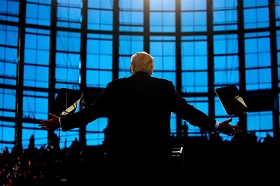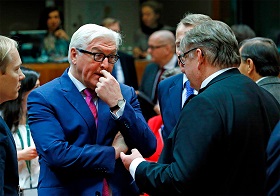Donald Trump’s victory in the US presidential election has generated an enormous amount of speculation about the future of US foreign policy. Indeed, the campaign rhetoric of the president-elect featured a large number of high-profile statements. Clearly, his real policy should and will be characterized by much greater restraint and caution. Ultimately, the president does not make decisions all by himself. He is constrained by Congress. His opinion is filtered through the sieve of intelligence agencies, the government, the interests of US companies and, to some extent, even overseas allies. Provocative behavior is to be expected from Donald Trump. However, public politics and actual politics are two fundamentally different things.
Donald Trump’s victory in the US presidential election has generated an enormous amount of speculation about the future of US foreign policy. Indeed, the campaign rhetoric of the president-elect featured a large number of high-profile statements. Clearly, his real policy should and will be characterized by much greater restraint and caution. Ultimately, the president does not make decisions all by himself. He is constrained by Congress. His opinion is filtered through the sieve of intelligence agencies, the government, the interests of US companies and, to some extent, even overseas allies. Provocative behavior is to be expected from Donald Trump. However, public politics and actual politics are two fundamentally different things.
As such, comments by major Western officials seeking to “talk sense” into Trump with regard to Euro-Atlantic security have caused considerable surprise among outside observers. Among them, Secretary General Jens Stoltenberg’s attempt to explain to the US president-elect the importance of NATO, or the German defense minister’s remarks that NATO cannot be approached as a business. Do these seasoned officials really believe that the personal factor has such huge import for the future of Euro-Atlantic security?
It appears that their political instincts are not betraying them. It was no doubt easier to calmly accept the election results in the United States eight to twelve years ago, when the system of international relations seemed much more stable and you could still count on institutions to easily absorb the personality of even the most ambitious politician.
Emotions are quite different now. One after another, events are casting great doubt on even the most durable constructs. A landslide has not yet begun. But the past equilibrium has been disrupted. In such situations, fluctuations play a larger role, and that includes, of course, charismatic and decisive leaders. Their actions can provoke critical changes with consequences that are very difficult to predict. No doubt, Donald Trump is such a leader. His policies may well test the viability of existing rules of the game, or the rules that are still in the making. It is possible that institutions will prevail and become even stronger. However, there could also be a precipitous change resulting in their total loss of control over the process. It seems that this is the concern of those who are trying to shape the agenda of the president-elect.
Undoubtedly, this anxiety has been reinforced by recent events. The West explains the Ukraine crisis primarily as the result of decisive actions by Vladimir Putin. The cooperation mechanisms that existed between Russia and a number of West-centered institutions went back to zero in a very short period. They were unable to prevent the crisis in relations, as they were unable to resolve the problems that led to it. The Russian leader has shown that he was unwilling to accept a state of affairs that was disadvantageous to him and destroyed it almost overnight.
Donald Trump can be expected, explicitly or implicitly, to act in a similar fashion. It’s not that he has a pre-designed strategy for deep reform. Just the opposite. He has no such strategy. But there’s a huge number of problems, imbalances, multiplying liabilities and depreciating assets in the US foreign policy, which opens up ample space for passionate creativity with all the ensuing risks for those who are accustomed to the comfort of old institutions and established realities.
For Euro-Atlantic security, Trump's rise to power increases the stakes for a number of important strategic choices, including policy regarding NATO, US-Russian relations, strategic stability, and the priorities of America’s Asia policy. Let's review them in greater detail.
Pre-election statements by Donald Trump regarding the need to revise the role of the United States in NATO frightened many. Indeed, there is already a backlog of problems here. America has traditionally underwritten the security of its European allies. During the Cold War and containment of the Soviet Union, it was quite justified. Furthermore, US allies in Europe were willing to mobilize much more of their military capacity compared to now. Following the end of the Cold War, the number of security clients in Europe grew, but the need and motivation for mobilization fell sharply. More than that, the alliance proved unprepared for new challenges, such as terrorism or civil wars on the periphery.
The Ukraine crisis has restored the raison d’etre for NATO in its current form. But even if we consider Russia as a threat, the new rivalry differs radically from the Cold War period. It is affected by a great number of independent variables that are beyond the control of either Moscow, or Washington, or Brussels. They vary from the unpredictability of the Ukrainian domestic situation to the Brownian motion of radicals in the Middle East. Each of these variables can pit NATO against Russia. Even if it doesn’t, mutual deterrence will not resolve any of the problems which gave rise to the rivalry. Not to mention the shared problems in the periphery.
Donald Trump is unlikely to end or significantly reduce the US role in NATO. This would only multiply problems. But he can take stock of NATO assets and liabilities. Even if you follow the advice of the German defense minister and treat the Alliance as a kind of public good and a shared security asset, even then it is possible to raise questions about its effectiveness and possible restructuring.
This restructuring will not necessarily benefit Russia. Ultimately, it will depend on the goals that Trump himself considers most important. The dialogue with Russia will play a critical role here.
There is no reason to share in the optimism or in the fears of those who expect a major shift in Russia-US relations. However, Trump’s presidency does open a small window of opportunity, which would not have existed with Clinton. The president-elect may well try to resolve key issues, primarily the Ukraine conflict. Much will depend on Russian diplomacy and its ability to reap the benefits of such a dialogue.
Clearly, the Ukrainian conflict will be among the main issues on the agenda of Russia-US relations. Focusing on a short but specific list of priorities and the most pressing issues on which progress could be made seems like the best strategy for the Russians and the Americans. Trying to resolve everything with one major deal is unlikely to be successful. Ultimately, Russia and the United States along with its allies are external players. It is critical for the Kiev authorities to be a party to the process and not sabotage it. The sequence of steps outlined in the Minsk agreements could be one such area of agreement. Holding elections in Donetsk and Lugansk would be a great achievement by itself.
A similar situation may arise with regard to the Syrian conflict. An unsuccessful attempt by Russia and the United States to come to an agreement on Syria makes a new major deal unlikely. Here, too, both countries could focus on one or more systemic issues, such as drawing a line between terrorists and the moderate opposition.
Chances are high that progress won’t be made on either of these issues. In this case, Donald Trump can be expected to take drastic steps and exert strong pressure on Moscow, including military pressure. The risk of intentional or unintentional escalation in this case will be high. New sanctions triggered by new incidents are entirely possible.
However, any military pressure by the Americans will push Moscow further towards military partnership with Beijing. Russia and China are unlikely to form a full-fledged military alliance. But this is not necessary for Washington to find itself faced with the prospect of dual containment of Moscow and Beijing. In its own time, the Soviet Union had to bear such a burden holding back both China and the United States even though the latter were not military allies.
Therefore, Trump and his team will have to either retreat in their relations with China, or try to figure out problems with Moscow. The first option is more convenient for the United States, given the level of economic interdependence and the general background of its relations with China. However, in this scenario, China will benefit much more. It will be able to further advance its interests (including in the South China Sea) and remain a partner of Russia, maintaining calm on that border. In any case, Beijing's relations with Moscow and Washington will be much better than relations between Moscow and Washington.
Clearly, a calm and measured approach to all key areas would be the best option for Donald Trump at this time. The president-elect is unlikely to benefit from drastic steps with huge expectations, as the chance of serious disappointment is high. Such steps must be reserved for a small set of systemic issues that offer a foothold for greater achievements in the future.
Ivan Timofeev leads the program “Contemporary State” at Valdai Discussion Club. Also he has been a Director of Programs at the Russian International Affairs Council (RIAC) since 2011.
First in published in Valdai Discussion Club.







